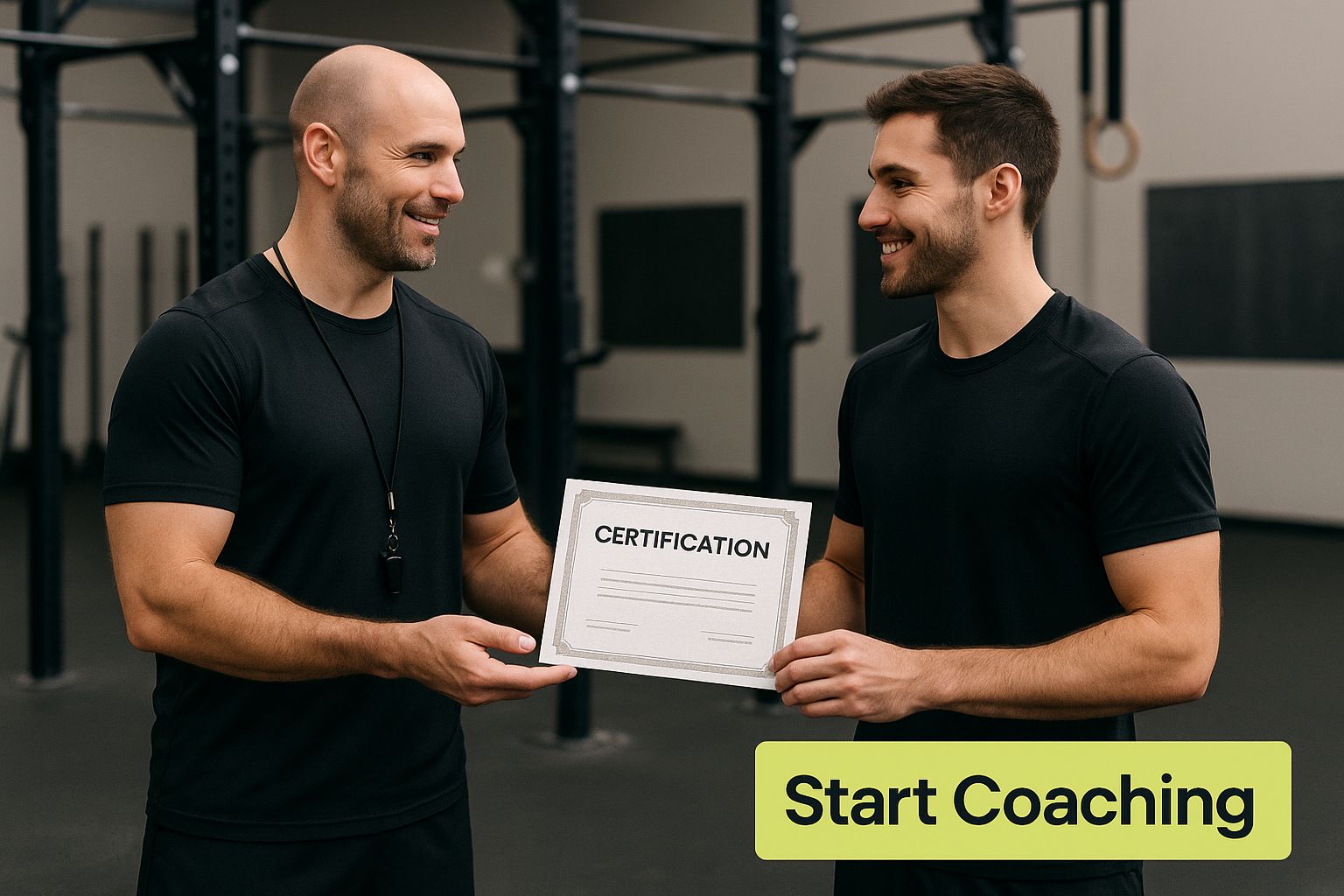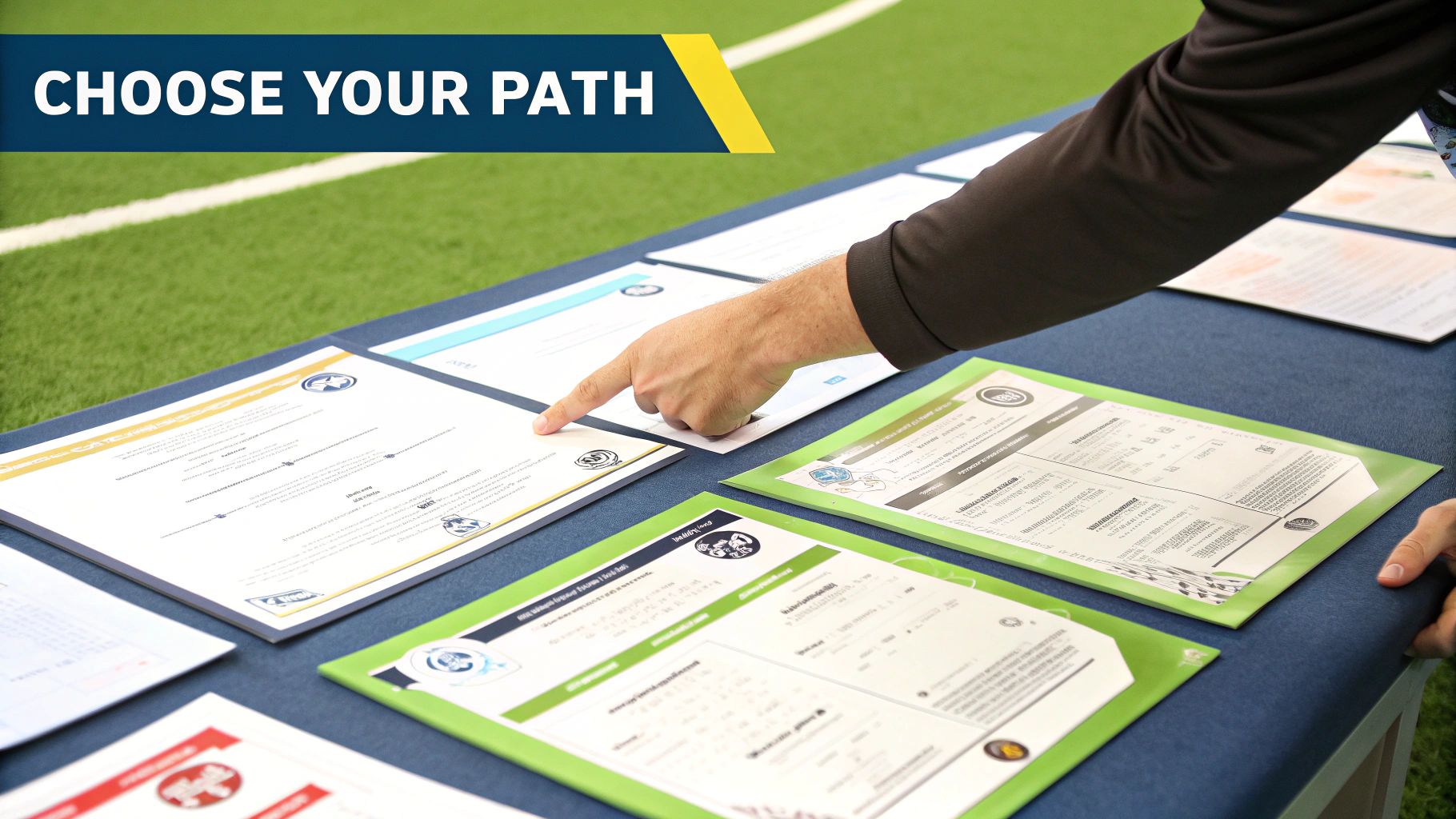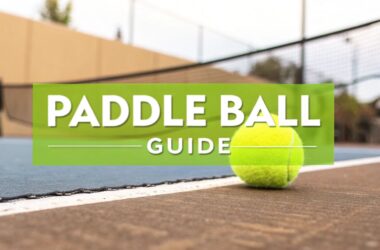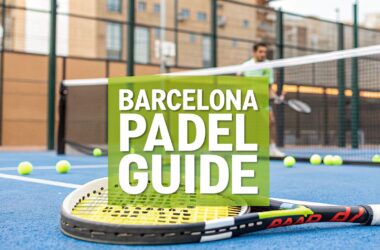Sports coaching certification programs are your ticket from the sidelines to the center of the action. They are structured educational courses designed to give you the essential training, safety know-how, and tactical knowledge needed to lead athletes with confidence.
Think of it like getting a pilot's license. Sure, passion gets you interested in flying, but the formal training is what ensures you can handle the aircraft safely, professionally, and under pressure. This credential is what separates a knowledgeable fan from a trusted professional coach.
Your First Step to Becoming a Professional Coach
Stepping into a coaching role is about so much more than just knowing the rulebook. It's about becoming a leader, a mentor, and the person responsible for creating a safe, positive, and developmental environment for your athletes. A formal certification gives you the blueprint for all of this, building your credibility from day one with athletes, parents, and organizations.
These programs are built to give you a specific set of skills that sheer passion can't teach. They take your raw enthusiasm for a sport and shape it into a structured, effective coaching method.

Buy the best padel gear to level up your next game!
CHECK OUT this deal from Padel Market!Get ready to take your game to the next level with the latest padel gear from Padel Market! Fast EU and Worldwide Shipping
Core Competencies You Will Develop
Most high-quality certification programs are built on a few key pillars. Getting a handle on these will show you just how valuable they are:
- Athlete Safety and Risk Management: This is all about learning to spot and prevent injuries, understanding critical concussion protocols, and knowing exactly what to do in an emergency.
- Ethical Conduct and Responsibility: You'll get a firm grasp on the professional standards, codes of conduct, and legal duties that come with the coaching title.
- Sport-Specific Skills and Tactics: Here's where you master the technical and strategic side of your sport, from teaching fundamental drills to planning advanced game-day strategies. If you're looking to dive into a specific niche, guides on topics like how to become a padel coach can offer some great specialized insights.
This image really captures that pivotal moment for an aspiring coach—receiving their certification and officially starting their professional journey.

As the image suggests, earning that certification is the first real, tangible step toward building a legitimate and respected career in coaching.
To give you a clearer picture, most programs cover a few core areas that are non-negotiable for professional coaching.
Table: Key Pillars of Coaching Certification
| Competency Area | What You Learn | Why It's Critical |
|---|---|---|
| Safety & First Aid | Injury prevention, CPR, concussion protocols, emergency action plans. | This is your #1 priority. It ensures you can create a safe environment and respond correctly in a crisis. |
| Sport Science | Basic principles of kinesiology, nutrition, and strength & conditioning. | Helps you design effective, age-appropriate training that maximizes performance and minimizes injury risk. |
| Ethics & Responsibility | Codes of conduct, legal duties, and positive coaching philosophies. | Builds trust with athletes, parents, and employers by establishing your professional integrity. |
| Technical & Tactical Skills | Sport-specific drills, game strategy, and player development models. | This is the "X's and O's"—the practical knowledge needed to actually teach the sport and win games. |
These pillars form the foundation of any good coaching program, turning your passion for the game into a professional skill set.
Building Your Professional Foundation
A certification is so much more than just a piece of paper; it’s a powerful tool for building your career. It sends a clear signal to employers and clients that you've met a verified standard of excellence and are serious about your professional growth. This credential will open doors to better opportunities at schools, clubs, and private organizations that you just wouldn't have otherwise.
A coaching certification fundamentally changes how you are perceived. It immediately establishes you as a serious professional who has invested in mastering the craft of coaching, not just the sport itself.
Of course, getting certified is just the start. You also need to know how to turn that credential into a career. That's where learning things like how to start an online coaching business comes in, helping you translate your new skills into a successful venture.
Bottom line? A certification is the indispensable starting block for any serious coaching career.
Finding the Right Type of Coaching Certification
Trying to pick a sports coaching certification can feel like you're staring at a giant, confusing map with no "You Are Here" sticker. It's easy to get overwhelmed by all the different paths. But things get a lot simpler once you realize most programs fit into a few main categories, each built for a different kind of coaching journey.
Think of it like picking the right tool for a job. You wouldn't use a sledgehammer to hang a picture frame, right? In the same way, the certification you need depends entirely on where you're headed. Are you coaching the local T-ball team on weekends, aiming for a spot on a college staff, or looking to become a specialist in a specific area of performance?

Let's break down the main types of certifications so you can find the perfect route for your coaching goals.
Sport-Specific Certifications: The Technical Blueprint
For most coaches, this is ground zero. Sport-specific certifications are offered by the official national governing body (NGB) for a sport, like USA Basketball, U.S. Soccer, or USA Swimming. Their main job is to teach you the nitty-gritty technical and tactical side of that one sport.
This is where you learn the "X's and O's." You'll master how to teach the fundamentals correctly, get to know the official rules backward and forward, and learn how to put together a game plan. These are absolutely essential if you want to be seen as a credible expert in your sport.

Buy the best padel gear to level up your next game!
CHECK OUT this deal from Padel Market!Get ready to take your game to the next level with the latest padel gear from Padel Market! Fast EU and Worldwide Shipping
A sport-specific certification is your badge of honor. It signals to clubs, parents, and athletes that you've been trained by the official authority on how to teach the game the right way—and the safe way.
The influence of these programs is huge. The global sports coaching market is a behemoth, valued at around USD 8.18 billion, and it's only getting bigger. Within that, soccer coaching eats up the biggest piece of the pie with a 46.59% revenue share. A big reason for that is its deep-rooted, tiered certification pathway that clubs all over the world require. You can dive deeper into the sports coaching market data to see how these trends are playing out.
General Coaching Certifications: The Universal Principles
If sport-specific certs teach you what to coach, general certifications teach you how to coach. These come from broader organizations like the National Federation of State High School Associations (NFHS) or the Positive Coaching Alliance. The focus here is on the universal truths that make a great coach, no matter the sport.
You'll typically cover things like:
- Sports Psychology: Getting inside your athletes' heads to understand motivation, build team chemistry, and handle the pressure of competition.
- Principles of Coaching: Learning how to communicate effectively, foster a positive culture, and navigate tricky ethical situations.
- Athlete Development: Understanding the physical and mental growth stages kids go through.
These programs are where you build the "soft skills" that separate the good coaches from the truly great ones. They give you the tools to be a better leader, mentor, and communicator.
Level-Based Certifications: A Progressive Pathway
Many governing bodies don't just have one certification—they build a ladder. This level-based or tiered system gives you a clear path to follow as you get more experience under your belt.
A typical progression might look like this:
- Level 1 (Foundation): Built for the rookie—think volunteer parents or brand-new coaches. It covers the absolute must-knows: safety, basic drills, and how to run a practice for young kids.
- Level 2 (Intermediate): This is for coaches stepping up to more competitive club or high school teams. Here, you get into more advanced tactics, planning out a season, and fine-tuning skills.
- Level 3 (Advanced/Elite): For the pros working with top-tier athletes at the college, national, or even professional level. This is a deep dive into complex strategy, sports science, and managing elite performers.
This structure makes sure your knowledge grows with you, and your credentials always match the level of competition you're coaching.
Specialty Certifications: Honing a Niche Skill
Finally, we have specialty certifications. These let you become a true expert in one specific piece of the athletic puzzle. They're perfect for coaches who want to carve out a niche for themselves or add a powerful skill to their toolkit.
Some popular examples include:
- Strength and Conditioning (CSCS): One of the most respected certs out there, focused on designing safe and effective training programs.
- Sports Nutrition: Guiding athletes on fueling their bodies for peak performance and recovery.
- Goalkeeping or Pitching Coach: Highly specialized roles within sports like soccer or baseball that require a unique skill set.
Grabbing a specialty certification can make you a more versatile and in-demand coach, opening up new doors and allowing you to bring even more value to your athletes. By understanding these four pathways, you can stop guessing and start strategically choosing the certifications that will get you where you want to go.
Breaking Down the Cost and Time Commitment
Pursuing a coaching certification is a serious investment in your future, but what does that really look like? The resources you'll need—both money and time—can swing wildly from one program to the next. Getting a handle on this spectrum is the key to planning your next move without any nasty surprises down the road.
The financial side can be anything from less than a hundred bucks for a basic online course to several thousand for an advanced, hands-on specialty. Likewise, the time you'll put in might be just a few self-paced hours online, or it could mean dedicating multiple weekends to intensive, in-person workshops. The trick is to match the investment to your actual coaching goals.

Let's pull back the curtain on what these numbers actually mean so you can budget your resources like a pro.
Analyzing the Financial Investment
Think of the cost of a certification less like a single price tag and more like tuition for a college class—it's a package deal. That upfront fee usually covers a few core components bundled together.
Most certification fees will include:
- Course Materials: This is your toolkit—think digital or physical textbooks, online learning portals, and video tutorials.
- Instruction and Training: You're paying for access to experts, whether that’s through live webinars, face-to-face sessions, or online forums.
- Exam Fees: The cost to sit for the final certification exam is almost always baked into the initial price.
- Practical Assessments: For programs that require hands-on skill demonstration, this covers the cost of evaluating your coaching in a real-world scenario.
But don't stop at the sticker price. You have to be on the lookout for the "hidden" costs that can pop up later. These might include annual renewal fees to keep your certification active, mandatory memberships in a coaching association, or travel and lodging for those in-person workshops. For instance, some credentials require an ongoing annual membership of around $50-$150 just to stay in good standing.
The sticker price of a certification is just the starting point. Always read the fine print to understand the full financial picture, including renewal fees and any required continuing education costs down the line.
A little foresight here ensures you're prepared not just for the initial spend, but for the ongoing commitment to your professional growth.
Mapping Out the Time Commitment
Just as the costs vary, so does the time you’ll need to block out on your calendar. Thankfully, most programs are designed to fit different lifestyles, from the busy professional juggling a full-time job to a student with a more open schedule.
You'll generally run into a few common formats:
- Self-Paced Online Courses: These are the definition of flexibility. You can chip away at modules whenever you have a spare moment, which is perfect for coaches with unpredictable schedules. Most of these take anywhere from 10 to 40 hours of total work to complete.
- Structured Weekend Workshops: A lot of in-person certifications cram their training into intense, multi-day workshops. They're fantastic for hands-on learning and networking, but you'll need to completely clear your schedule for a full weekend or two.
- Hybrid Models: A really popular option blends the two. You’ll do the book learning online at your own pace, then show up for a required in-person session to prove you can apply your skills.
The time you invest also scales with how advanced the certification is. An entry-level credential might be a quick online course you knock out in a week. At the other end of the spectrum, an elite specialty like a Certified Hand Therapist (CHT) demands a staggering 4,000 hours of direct practice experience before you can even think about sitting for the exam.
Comparing Certification Program Investments
To really put this all into perspective, let's look at how the required investment lines up with different coaching ambitions. The following table gives you a side-by-side comparison of what you can expect to spend in both time and money for various types of programs.
| Certification Level/Type | Typical Cost Range (USD) | Typical Time Commitment | Best For |
|---|---|---|---|
| Volunteer Youth Coach (Level 1) | $50 – $250 | 5-15 hours (online, self-paced) | Parents, community volunteers, or new coaches needing foundational safety and sport-specific basics. |
| High School/Club Coach (Level 2) | $300 – $800 | 20-50 hours (hybrid or in-person) | Aspiring and current coaches at competitive secondary school or club levels seeking tactical knowledge. |
| Collegiate Strength Coach (CSCS) | $500 – $1,500+ | 100+ hours (intensive study & practicals) | Professionals aiming for high-performance roles in college or professional sports organizations. |
| Specialty Certification (e.g., NDT) | $2,000 – $3,500+ | Multi-week intensive course | Experienced coaches specializing in a niche like Neuro-Developmental Treatment to become experts in their field. |
As you can see, the investment grows right alongside the level of responsibility and expertise the role demands. A volunteer soccer dad needs a completely different level of training—and budget—than someone gunning for the head strength coach job at a Division I university. If you start by defining your goals clearly, you’ll find a program with a cost and time commitment that makes perfect sense for your journey.
How to Choose the Right Program for Your Career
Now that you have a better feel for the costs and time involved, you’re ready to make a choice. Picking the right sports coaching certification isn't about finding some mythical "best" program. It's about finding the one that fits your specific career path like a glove. This is your game plan for making a smart decision that will actually move your career forward.
Think of it like a pro athlete scouting their next team. They don't just sign with the biggest name. They look at the coaching staff, the team's system, and how their own skills will plug in and make an impact. You need to bring that same strategic mindset to choosing your certification.
Start with Accreditation and Recognition
Before you even glance at a program's curriculum, you have to check its credentials. Accreditation is the single most important factor—it’s your proof of quality and credibility. This is the official stamp of approval from a recognized authority, confirming the program meets serious professional and educational standards.
Going with a non-accredited program is like buying a car without a title. It might look the part, but it has no official value and won’t be recognized by anyone who matters. You should be looking for certifications that are backed by your sport’s national governing body (NGB) or other respected industry organizations.
A program's accreditation is your quality guarantee. It ensures your investment of time and money results in a credential that employers, athletes, and organizations will respect and trust.
This recognition is everything. A credible certification does more than just beef up your resume; it gives you a level of legitimacy that's absolutely critical for building a real career in a competitive field.
Align the Program with Your Career Aspirations
Where do you picture yourself coaching in five years? The answer to that question will slice your list of options way down. A certification built for a volunteer youth league coach is going to be worlds away from one designed for an aspiring collegiate strength and conditioning guru.
Map out your goals:
- Youth and Recreational Sports: Here, your focus should be on the fundamentals: safety, positive coaching techniques, and basic sport-specific skills.
- High School and Competitive Club Sports: You'll need more advanced tactical knowledge, the ability to plan a full season, and a much deeper grasp of long-term athlete development.
- Collegiate and Professional Levels: These roles demand elite-level certifications, often with specializations in areas like performance analytics or sports psychology.
For instance, if you're drawn to a fast-growing sport, you might dig into specific resources like our in-depth guides on padel coaching and certifications to see what a clear career path looks like. It can also be helpful to see what related fields are doing; checking out top wellness coaching certification programs can offer some interesting perspective as you weigh your options.
Evaluate the Curriculum Focus and Delivery Method
Once you've zeroed in on the right level, it's time to pop the hood and look at the curriculum. Does it lean heavily on practical, on-field skills, or is it more about theory and sports science? Make sure the program's focus lines up with what you actually need to learn to be successful.
Next, think about the delivery method. The choice between online, in-person, or a hybrid model usually boils down to your learning style and what your life looks like right now.
- Online Programs: These offer maximum flexibility and are perfect if you're juggling a job or other commitments.
- In-person Workshops: You get invaluable hands-on experience and fantastic networking opportunities you just can't get online.
- Hybrid Models: This approach often gives you the best of both worlds—the convenience of online learning paired with crucial in-person practicals.
The global sports coaching certification market, valued at around USD 4.3 billion, is booming for this very reason. It offers a huge variety of options to meet the worldwide demand for qualified coaches. This growth is being fueled by a growing understanding of just how vital structured training is for athlete safety and development. By carefully weighing these factors—accreditation, career goals, curriculum, and delivery—you can confidently pick a program that will be a powerful launchpad for your coaching career.
How Technology Is Reshaping Coach Training
Let’s be honest, the old way of training coaches—stuck in a stuffy classroom for a weekend with a massive binder—is on its way out. Coaching education is going through a huge overhaul, and technology is in the driver’s seat. Digital tools are making **sports coaching certification programs** more accessible, dynamic, and frankly, a lot more effective than they used to be.
This isn't just about scanning old handouts and putting them online. It's a fundamental change in how coaches actually learn, practice, and put their new skills into action. The result is a whole new breed of certifications that get coaches ready for the data-driven world of modern sports.
The Rise of Immersive and Data-Driven Learning
One of the coolest developments is the use of virtual reality (VR) and augmented reality (AR) for tactical training. Imagine running through complex game-day scenarios against a virtual opponent, letting you make real-time decisions without the pressure of a live game. VR is a game-changer, letting aspiring coaches practice everything from clock management to play-calling in a totally risk-free, repeatable environment.
It’s the difference between reading about a flight simulator and actually hopping in the cockpit. This kind of immersive practice builds decision-making muscle memory that a textbook just can't touch.
On top of that, data analytics is now a central piece of most modern curricula. Today's programs teach you how to make sense of performance stats from wearables, break down game film with specialized software, and use all that data to build personalized training plans for your athletes.
Certifications are no longer just teaching the "what" of coaching; they're teaching the "why" by backing up every strategy with hard data. This shift gives coaches the tools to make smarter, evidence-based decisions that give their teams a real competitive edge.
Integrated Platforms and Mobile Accessibility
The way coaching education is delivered has also become way more flexible. Gone are the days of being chained to a desktop computer to get your work done. Many certification providers now have mobile apps that let you access course materials, track your athletes' progress, and chat with mentors from anywhere.
This on-demand style makes professional development realistic for coaches who are already juggling crazy schedules. Learning is no longer a scheduled event—it’s a continuous part of your coaching life.
These trends are also driving some serious market growth. The global sports coaching platforms market, which blends certification with technology, was valued at around USD 0.34 billion and is projected to climb to USD 0.87 billion by 2029, growing at a rate of 20.6% annually. This boom is directly linked to better internet access worldwide, which makes remote, tech-powered training possible for more coaches than ever. You can dig deeper into the growth of the sports coaching platform market and see where it's headed.
Essential Tech Skills for the Modern Coach
As tech becomes more baked into sports, the skills a coach needs have grown. Good certification programs now focus on building your digital literacy in a few key areas. Knowing how to use these tools has become just as important as running a great practice, and as our guide on sports facility management software points out, technology now supports the entire sports ecosystem.
A forward-thinking certification will get you skilled up in:
- Video Analysis Software: Learning to break down game film to give players precise, actionable feedback on their technique and positioning.
- Performance Monitoring Tools: Understanding how to use data from GPS trackers, heart rate monitors, and other wearables to manage your athletes' workload and prevent injuries.
- Advanced Communication Platforms: Using dedicated apps to keep communication clean and simple with athletes, parents, and staff, making sure everyone is on the same page.
When you master these digital tools, you don't just become a better coach—you also become a much stronger candidate for top-tier coaching jobs. The future of coaching is here, and it's powered by technology.
Frequently Asked Questions About Coaching Certifications
Diving into the world of sports coaching certifications can feel like learning a whole new playbook. Even after you've scouted the different programs and weighed the costs, a few questions probably still linger. This is where we clear up the confusion.
Think of this section as your final huddle. We've gone through the strategy, and now it's time to tackle those last-minute questions so you can hit the field with total confidence.
How Long Does a Sports Coaching Certification Last?
This is a big one. Does getting certified mean you're set for life? The short answer: almost never. The best sports coaching certification programs aren't a one-and-done deal. They require you to renew them periodically to make sure you’re still on top of your game.
This isn't just bureaucratic red tape; it's a mark of quality. Think about it: sports science, safety rules, and coaching techniques are always evolving. A credential that never expired would become obsolete fast. Renewal requirements keep the certification valuable and respected.
A certification that needs renewing is a good sign. It shows the organization behind it is serious about maintaining high standards and making sure its coaches stay sharp and current throughout their careers.
So, how often will you need to re-up? Renewal cycles typically fall somewhere between every two to five years. For instance, a Certified Hand Therapist (CHT) has to recertify every five years, while a Certified Brain Injury Specialist (CBIS) renews annually. The process usually involves earning continuing education units (CEUs) and paying a fee, which can be anywhere from $50 to over $250.
Can I Get a Coaching Job Without a Certification?
Technically, yes. You might be able to coach a volunteer tee-ball team or a low-key rec league without any formal credentials. But if you're asking about building a real, professional coaching career? The answer is a hard no.
For any paid coaching gig at a school, competitive club, or sports organization, a certification is pretty much mandatory. Here’s why:
- Liability and Insurance: Organizations need to protect themselves. Hiring coaches who are certified in safety, first aid, and risk management is a must for their insurance providers and drastically reduces their liability.
- Credibility and Trust: A certification is the quickest way to show parents and athletes that you know what you're doing. It’s an immediate signal that you’ve met a professional standard.
- Quality Control: Leagues and governing bodies rely on certification to create a baseline standard for coaching. It ensures every athlete gets a safe and fundamentally sound experience.
Trying to build a professional coaching career without certification is like trying to be a personal trainer without any credentials. You might have all the passion in the world, but you lack the proof that institutions and clients need to see.
What Is the Difference Between a Certificate and a Certification?
This is a common point of confusion, but the distinction is incredibly important. People often use these terms interchangeably, but they mean very different things in the professional world.
A certificate program shows you completed a course or a series of classes. It’s proof that you received training on a particular topic. Think of it as evidence of learning.
A certification, however, is a professional credential. It's awarded only after you’ve met a set of specific, tough standards. Getting certified usually requires you to:
- Meet certain prerequisites (like having a degree or a specific number of coaching hours).
- Pass a rigorous, comprehensive exam.
- Agree to uphold a professional code of ethics.
- Commit to ongoing education to keep the certification active.
In a nutshell, a certificate proves you learned something. A certification proves you can do something to a verified professional standard. When it comes to your career, a certification will almost always open more doors.
Are Online Certifications Respected?
Absolutely. The old stigma against online learning has faded, especially in the coaching world. Today, many of the most reputable organizations and governing bodies offer their sports coaching certification programs either fully online or in a hybrid format.
What truly matters isn't how you learned the material, but who you learned it from. The key to respectability is the accreditation and reputation of the organization issuing the credential.
An online certification from a major national governing body (NGB) or a top-tier institution like the National Strength and Conditioning Association (NSCA) is just as valuable as one earned in person. Employers care about the name on the credential, not whether you studied from home or in a classroom.
Just be careful to avoid "diploma mill" websites that promise instant certification for a fee with no real learning involved. A legitimate online program will have a structured curriculum, proctored exams, and clear standards you have to meet.
At Padel Rumors, we believe that a solid foundation of knowledge is the first step toward excellence, whether you're learning the game or coaching it. For more expert guides, gear reviews, and insights into the world of padel, explore our resources at https://padelrumors.pages.dev.










